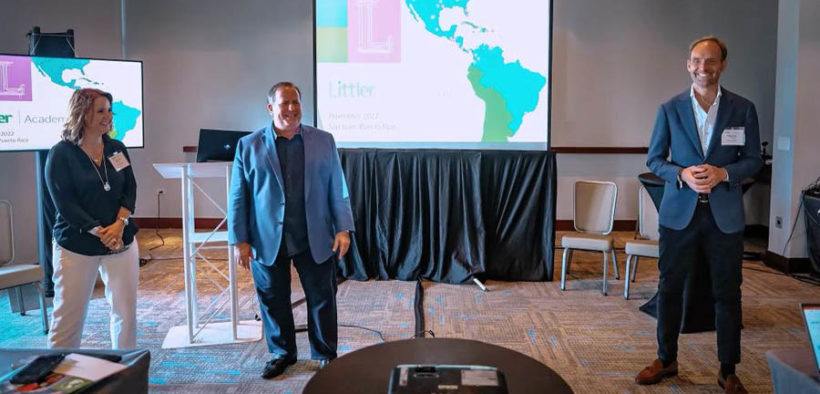Pandemic changed the workplace, now laws must catch up

The COVID-19 pandemic, which virtually brought the world to a standstill for nearly two years, gave way to a new generation of workers — those who work remotely, from anywhere in the world and who, after getting a taste of it, want to keep the flexibility they found as a result.
And while companies scramble to adjust to the new worker mindset, so must lawmakers who are going to have to work with employers to lay down a new set of workplace ground rules.
In an exclusive interview with News is my Business, attorneys from Littler Mendelson, a global legal firm specializing on workplace solutions related to labor and employment laws, and its local partners at Schuster LLC discussed how the new trends are affecting not just companies across the US mainland, but also in Puerto Rico.
“What is being felt on the mainland is like what’s being felt around the world too. Of course, we’re coming out of the pandemic, hopefully, and most of us are wrestling with the issues involved with employees returning to offices and workplaces,” said Peter Susser, Global Practice Leader, and chair of Littler Mendelson, during a recent visit to Puerto Rico as part of a teambuilding event for the firm.
“Many of us have shifted to hybrid work environment, so that’s probably the major thing that’s being felt commonly I think around the world and in the in the states,” he said. “The biggest challenge that employers are facing these days is finding the right teammates and folks to bring on to work at the company and it does kind of reflect the limited success and advancement that public policy and even companies have been able to achieve in terms of workforce preparedness and training for the new types of business and work and jobs that we’ve had developing over the last couple of decades.”
He said many companies and government agencies are “not effectively being prepared for the evolution, that continuing evolution that technology and other factors bring.”
And while Puerto Rico may have been ahead of the curve in several aspects related to the COVID-19 pandemic and extended lockdowns, there remains work to be done, said Mariela Rexach, capital member of Schuster LLC, which is Littler’s local partner.
“Puerto Rico was ahead of the curve, and we were able to share with our colleagues stateside what our experience was here with these specific legislation and administrative orders that were being approved and then the vaccination requirements, which also happened way ahead of what was happening stateside,” said Rexach, who has been selected among 2023’s “Best Lawyers Awards” recipients.
The attorney referred to two most notable tendencies that spurred from the pandemic: “quiet quitting” — which is an informal way of describing the practice of reducing the amount of effort an employee is putting into their job — and the “great resignation,” a significant wave of giving two-week’s notice.
“What the COVID issues that we’ve been living for over the past 2 1/2 years have brought to the forefront is the need for flexibility. I think you can sum up that what most workers want and what leads to these issues like ‘quiet quitting’ or the ‘great resignation’ is a workforce that is trying to make the workplace a little bit more flexible.”
Laws lag trends
But laying down the legal framework for new workplace demands has not been as swift as the trends.
In Puerto Rico, Gov. Pedro Pierluisi signed into law Act 52, to address the pandemic-related issue of employees working remotely from the island for “out-of-state” employers who have no physical presence or business ties on the island.
That mandate somewhat addresses the phenomenon of the wandering worker, who moved to work elsewhere, “which created a crisis of a certain sort because most jurisdictions were not ready to do that,” Rexach said, adding that matters such as who or where taxes get paid, who carries the responsibility of workers compensation and other costs are now coming into play.
“Act 52…is sort of half-way done precisely to allow people from the states whose employers don’t have presence here to be able to work from Puerto Rico. There are certain parameters that need to be met and there are certain things that need to happen, and I think this law is the halfway point,” said Rexach.
“There are some details that need to be fleshed out for that kind of work, but I think that’s one of the things that might help address these quiet quitting or great resignations. Workers who were just looking for flexibility,” she said.
“But we also need to keep in mind that our jurisdiction…that laws in Puerto Rico are very conservative, particularly in terms of vacation, overtime, meal periods, daily overtime and sometimes, while that can be beneficial in some respects, it does interfere with allowing this kind of flexibility for workers,” she said.
Puerto Rico hosts Littler Academy
As part of the visit by Littler attorneys to Puerto Rico, the global firm held its Littler Academy LATAM 2022, which gathered the best labor practice lawyers in Latin America.
Littler Shareholder Stephan Swinkels explained that the goal is to give Littler attorneys the opportunity to gather, network, share ideas and learn from each other to “become better lawyers.”
About 65 Littler attorneys landed in Puerto Rico — mostly from Latin American countries — with the goal of “seeing the differences and similarities that they all struggle with,” he said.
Swinkels, who is part of Littler’s operations in the Netherlands, said these gathering also contribute to identifying the unique conditions of different markets.
“We talked with our associates about how to advise our clients about diversity and inclusion policies and what the US does and try to implement them for companies that are not in the US, and have different demographics,” he said. “That’s just one example where the incorporations are obvious.












